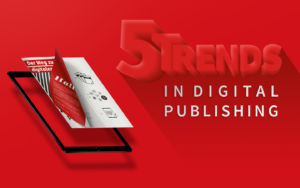Interview with Christopher Strobel, managing director of the publishing house Strobel Verlag
Thanks to various smart home technologies, digitization is increasingly being adopted in everyday life, fitting in as naturally as a lamp into one’s own home. For a specialist publisher in home technology, this provides a multifaceted repertoire of topics, but also the challenge of winning over analogue target groups to the digital realm.
Christopher Strobel, Managing Director of Strobel Verlag, sees in this target group an opportunity to test out new formats and even to make and learn from small mistakes.
PressMatrix: Mr Strobel, can you briefly introduce us to your publishing house?
Christopher Strobel: We call ourselves a specialist publisher for home technology. We publish several titles for the plumbing and heating sector, which are aimed primarily at installers and planners.
In addition, our publications serve the renewable energy market, the kitchen industry, and the market for LP gas.
Our B2C title “inwohnen” is available at newsagents four times a year.
PMX: On your website as well as in your publications, you are an exponent of the unconditional integration of smart technologies into home and building technology. To what extent would you claim to be a driver of digital change not only for home technolgy but also in the specialist publishing business?
CS: In home technology, the smart home theme is more than just a marketing gimmick. So for us it represents a new thematic focus within our publications.
Smart home technologies are being implemented more and more, especially in new buildings. Digital technology can improve comfort and security. The use of smart technologies for example in heating systems means increased comfort and efficiency. Being able to remotely control heating systems decentrally via the app or the possibility of factoring in the usage habits of residents, i.e. resolving the question of which rooms need to be heated at any one moment, also brings cost benefits.
This market and all it comprises is still very new for our target group, which is why we want to acquaint our readers with the relevant topics and of course we want to be trailblazers.
However, our information reaches our target groups through diverse channels. We orient ourselves according to their respective needs and reading habits.
PMX: The trade magazines of the Strobel publishing house are not just available in the classic print versions. Rather, the content is prepared in various formats and for diverse platforms, from websites to social media to YouTube and in an app. How important are the different formats in your eyes?
CS: Correct! In the 146th year of its existence Strobel Verlag brought out an app comprising our magazine assortment.
But our information reaches our target groups through diverse channels. We orient ourselves according to their respective needs and reading habits. This ranges from social media platforms such as Facebook and YouTube to Xing expert groups moderated by us.
PMX: What strategies do you pursue with the channels and what challenges have been faced?
CS: If advertising business models have not yet emerged in all cases, our general strategy is for these channels to increase our overall reach and be traffic drivers for our websites. Our websites are subject to professional marketing.
The challenge is that the different target groups respond to different approaches and we want to reach them on all possible channels. So, for instance, the technical planners are likely to be found in Xing expert groups, while the processors can be reached via Facebook or found browsing through YouTube.
PMX: What experiences have you already had on the various channels, what has proven itself and what has not? What do users and your readers say?
CS: In our experienceour target groups are slowly getting used to the digital and especially social media channels. In an industry like home technology, focussed on domestic installations with planners and craftsmen, digital natives are still the exception. It doesn’t bother us though, because here print still has great haptic value. And as a publishing house we have time to test digital models, collect experience, and occasionally make small mistakes that we can correct. Sometimes we even get the feeling that on the digital front we are thinking further ahead than our target groups.
PMX: The Strobel trade publications are available in a separate kiosk app. What challenges had to be overcome here? And what experiences have you had with the app?
CS: We had often been asked whether in addition to the print version Strobel publishers also offered an online edition for browsing or whether we even had our own app. People are certainly interested in having the information presented as it is in the magazine, i.e. in the same layout. In the course of our research, we decided to implement the PressMatrix App.
“… if specialist publishers can succed in getting their offers to their known user groups through the various channels, then the future for the specialist information sector doesn’t look bad at all.”
PMX: Finding suitable monetization models to finance free content is still a much discussed topic in the (specialist) publishing industry. What strategies are you pursuing in this regard at Strobel Verlag?
CS: We haven’t yet taken advantage of the advertising and sponsoring opportunities available in the app – but that’s on the agenda. Again, the advertising customers or the agencies must first learn how the sponsorship works in the app. The app offers the option of introducing variable subscription price models. Initially we have arranged it so that our print magazine subscribers receive free reader access via their customer number. Non-subscribers must buy the online edition in the app kiosk at the same price as the print edition.
PMX: At the recent Congress of the German Trade Press in Berlin, there was talk of an increase in turnover in the specialist publishing industry. It doesn’t seem to be going too badly at all. Do you think the new revenue models are over-hyped?
CS: At the congress of the German trade press there was unanimous agreement that if the specialist publishers succeed in bringing their offers to their known user groups via the various channels, the marketing of specialist information won’t be in bad shape in the future either. Ad revenue losses can be offset by new sponsorship forms, digital revenue on websites and in email newsletters, as well as through digital subscription models and e-paper sales.
PMX: Let’s cast a glance into the future: how do you think customer communication is going to change in the future or how much do you think your publishing company itself will need to change to stay successful?
CS: In the more distant future, publishers should certainly put more effort into learning about their users and readers. The next topic is lead generation and sales to top but highly interested target groups. Knowing what the customer wants or is going to buy next will be an interesting asset for publishers – one which our advertising clients of today will be keen to purchase tomorrow.
About Christopher Strobel:
Christopher Strobel has been working for Strobel Verlag since 1990 and since 2003 sole managing partner of Strobel Verlag GmbH & Co. KG. As a graduate in business administration, he is also a sponsor of the Wirtschaftsjunioren Deutschland (WJD) and a member of the Industrie- und Handelsclub (IHC) of the Arnsberg Chamber of Commerce and Industry and the World Plumbing Council (WPC). In addition, he is involved as an advisory board member of the board of the Verband Druck + Medien Nord-West e.V. and as a board member in North Rhine-Westphalia e.V. (VZV NRW).
The Strobel app is available for iOS, Android and Amazon.
Use smart technologies for your publications, for example an Alexa-Skill.

